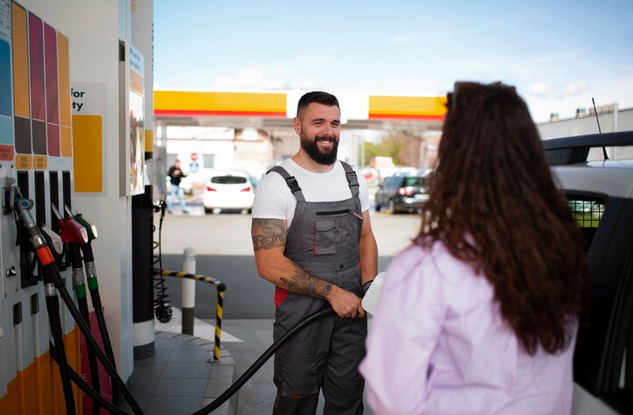How to Start a Petrol Pump Business in India: Step-by-Step Guide
Starting a petrol bunk (fuel station) in India involves a detailed and regulated process. Here’s a step-by-step guide to help you get started,
 Follow Vijay Broadcast on WhatsApp
Follow Vijay Broadcast on WhatsApp
 Follow Vijay Broadcast on Instagram
Follow Vijay Broadcast on Instagram

Learn how to start a petrol pump in India with this step-by-step guide. Covers eligibility, investment, licensing, and operational tips for a successful business.
1. Research and Planning
-
- Market Research: Analyze the demand for fuel in your target location. Look into the competition, local demographics, and traffic patterns.
- Business Plan: Create a comprehensive business plan outlining your objectives, target market, financial projections, and strategies.
2. Obtain Necessary Approvals
- Licensing and Permits: Contact the Ministry of Petroleum and Natural Gas and the respective State Government for information on the licenses and permits required.
- Land Acquisition: Secure a plot of land that meets the regulatory requirements for setting up a fuel station. The land should be large enough to accommodate fuel tanks, pumps, and other infrastructure.
3. Eligibility Criteria for a Petrol Pump License
-
- Age Requirement: Applicants must be at least 21 years old and no older than 55.
- Nationality: Indian citizens are eligible. NRIs must have resided in India for more than 182 days.
- Proof of Age: A birth certificate or 10th-grade mark sheet is required.
- Educational Qualifications:
- General Category: Minimum 12th-grade pass.
- SC/ST/OBC Categories: Minimum 10th-grade pass.
- Urban Dealerships: Graduation is mandatory.
- Freedom Fighters (CC2 Category): No minimum educational qualification is required.
- Investment Requirements:
- Rural Areas (with self-owned land): Rs 12–15 lakh.
- Urban Areas (with self-owned land): Rs 20–25 lakh.
- Location Restrictions: Business areas must not fall within blacklisted or excluded zones.
4. Investment Requirements for Setting Up a Petrol Pump
Establishing a petrol pump dealership requires a significant financial commitment, as the investment directly influences the success and sustainability of the business.
- Rural Areas: A minimum investment of Rs 15–20 lakh is needed.
- Urban Areas: If the land is self-owned, the required investment ranges from Rs 20–25 lakh.
In addition to personal savings, the following financial resources can be utilized to fund the setup:
- Savings accounts
- Bank deposits
- Bonds and shares
- Fixed deposits
- Mutual funds
- National Saving Certificates (NSC)
- Postal saving schemes
Ensuring adequate funding is crucial for the smooth establishment and operation of the petrol pump.
READ MORE:Starting Your Own Business in 2024 – Explore 82 Top Business Ideas
5. Applying for a Petrol Pump Dealership in India
Starting a petrol pump dealership in India involves several essential steps and considerations:
Careful Planning and Financial Support – Proper planning and securing financial assistance are vital for setting up and running a petrol pump successfully. Adequate funding ensures entrepreneurs can focus on key business aspects without financial strain.
Business Loan Options – Once the petrol pump is operational, owners can opt for business loans, such as those offered by Hero FinCorp, to cover operational costs or other business-related expenses.
Tailored Loan Solutions – With customized loan options, petrol pump owners can manage the challenges of the dynamic fuel retail sector while building a foundation for long-term growth.
Sustainable Business Growth – By leveraging strategic financing options, entrepreneurs can position their petrol pump business for sustainable success and capitalize on growth opportunities in the fuel retail market.
6. Choose a Fuel Supplier
- Tie-Up with an Oil Marketing Company (OMC): You need to get in touch with major OMCs like Indian Oil Corporation (IOC), Bharat Petroleum Corporation Limited (BPCL), or Hindustan Petroleum Corporation Limited (HPCL) to become a franchisee or dealer.
- Agreement: Enter into an agreement with the OMC, which will detail the terms of supply, branding, and operational guidelines.
7. License and Application Fees for Petrol Pump Dealership
License Fees
- ‘B’/’DC’ Retail Outlets:
- High-Speed Diesel: Rs 16/KL
- Motor Spirit: Rs 18/KL
- ‘A’/’CC’ Retail Outlets:
- High-Speed Diesel: Rs 41/KL
- Motor Spirit: Rs 48/KL
Application Fees
- Regular Retail Outlets: Rs 1,000
- Rural Retail Outlets: Rs 100
- Concessions for SC/ST/OBC Categories:
-
- A 50% reduction in application fees is provided to applicants from these categories.
-
7. Infrastructure Setup
- Construction: Develop the infrastructure including fuel storage tanks, pumps, and a convenience store if desired. Ensure the design complies with safety and environmental regulations.
- Safety Measures: Install safety equipment such as fire extinguishers, leak detection systems, and emergency shut-off systems.
8. Compliance and Certifications
-
- Environmental Clearance: Obtain clearance from the State Pollution Control Board.
- Fire Safety: Get a fire safety certification from the local fire department.
- Health and Safety: Adhere to the safety norms set by the Directorate General of Factories and Boilers.
READ MORE: Top 15 Best Marketing Strategy – Boost your Sales
9. Hire and Train Staff
- Recruitment: Hire staff for various roles including pump attendants, cashiers, and security personnel.
- Training: Provide training on operational procedures, safety protocols, and customer service.
10. Launch and Marketing
-
- Grand Opening: Plan a launch event to attract customers and create awareness.
- Advertising: Use local advertising methods, including banners, radio ads, and digital marketing to promote your petrol bunk.
11. Operational Management
- Daily Operations: Monitor daily operations to ensure smooth functioning, proper stock levels, and adherence to safety standards.
- Customer Service: Focus on providing excellent customer service to build a loyal customer base.
12. Compliance and Reporting
- Regular Inspections: Be prepared for regular inspections by regulatory authorities to ensure compliance with safety and operational standards.
- Financial Reporting: Maintain accurate financial records and submit necessary reports as required by the authorities and the OMC.
Starting a petrol bunk involves significant investment and adherence to regulatory standards. Engaging with a consultant or legal advisor who specializes in this field can also be beneficial to navigate the complex regulatory landscape.
Disclaimer: All values, calculations and our content are based on our own assumptions /thoughts /information’s available on internet. Please consult with your financial advisor before making any investment decisions based on this article. Vijay Broadcast is not responsible for any Profits / Losses. Thank you for reading, and we look forward to sharing another interesting article with you soon!
 Follow Vijay Broadcast on WhatsApp
Follow Vijay Broadcast on WhatsApp
 Follow Vijay Broadcast on Instagram
Follow Vijay Broadcast on Instagram
